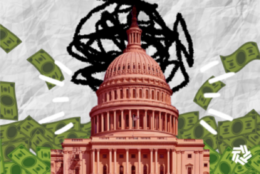Senate
-
Beth Cobert is on the job as the deputy director for management at the Office of Management and Budget. The Senate confirmed Cobert and 24 other nominees late Wednesday night.
October 18, 2013 -
The bill passed by Congress reopening the federal government after a two-week shutdown grants retroactive pay for furloughed federal workers and clears the way for all federal employees to receive a 1 percent pay raise in January. The continuing resolution, which funds government operations through Jan. 15, also grants agencies some spending flexibilities to avoid sequestration-related furloughs over the next few months.
October 17, 2013 -
The Senate and House both voted Wednesday night, passing a bill that reopens the government and funds agencies through Jan. 15, permits the Treasury to borrow normally through Feb. 7, and provides back pay for federal employees furloughed during the 16-day government shutdown. The bill now heads to President Barack Obama for his signature, which he has said he will sign immediately.
October 16, 2013 -
Two weeks into a government shutdown that has hamstrung federal agencies and sent large sections of their employees home without pay, Congress is heading for another last-minute showdown — this time over raising the government's borrowing authority, known as the debt ceiling.
October 15, 2013 -
The Office of Personnel Management has made it official: Lawmakers and their staff members are required to purchase health insurance from one of the Affordable Care Act's health-insurance exchanges --but the government will still contribute toward their premiums. OPM issued the final rule, which goes into effect immediately, Wednesday.
October 02, 2013 -
A government shutdown could furlough 800,000 federal employees. The shutdown could hit as early as Tuesday if a bitterly divided Congress fails to approve a temporary spending bill to keep the government running.
September 27, 2013 -
The cash-strapped U.S. Postal Service says it can return to being profitable and begin to pay down its debt if Congress gives it the authority to overhaul its health benefits structure. Postmaster General Pat Donahoe told the Senate Homeland Security and Governmental Affairs Committee Thursday that launching a postal-specific health care plan would help save the agency $8 billion annually through 2016.
September 26, 2013 -
Sen. Kelly Ayotte (R-N.H.) has put confirmation of Deborah Lee James on hold until she gets answers about possible cuts to the A-10 Thunderbolt attack fighter fleet.
September 26, 2013 -
Sen. Claire McCaskill (D-Mo.) wants to know whether many of the federal government's Senior Executive Service members are deserving of the bonus payments they receive. McCaskill, who chairs a Senate subcommittee on financial and contracting oversight, wrote to the head of the Government Accountability Office, asking the watchdog agency to investigate whether bonuses paid to SES employees involved in contract management are effective tools in reducing costs or improving contract performance.
September 25, 2013 -
OMB Director Sylvia Burwell received a letter from Sen. Tom Coburn earlier this month asking for the facts and figures on how agencies are spending acquisition funds in the fourth quarter.
September 24, 2013 -
Postmaster General Patrick Donahoe says a Senate bill aiming to overhaul the Postal Service's financial structure by providing the agency more flexibility to price its products is a good first step. Donahoe has been calling on Congress to approve comprehensive postal reform for much of the last two years. In that time, the cash-strapped agency has posted losses of $20 billion and defaulted on more than $11 billion in payments to prefund retiree health care costs. USPS is set to default on a $5.6 billion payment due Sept. 30 payment, Donahoe said.
September 19, 2013 -
Key senators on the Homeland Security and Governmental Affairs Committee are seeking answers into how the contractor employee responsible for the mass shooting at the Washington Navy Yard that killed 12 people obtained his security clearance. In a Sept. 18 letter, Sens. Claire McCaskill (D-Mo.) and Jon Tester (D-Mont.), requested the Office of Personnel Management's inspector general look into what type of clearance the shooter, identified as 34-year-old Aaron Alexis, held as well as what federal agency conducted his background investigation.
September 18, 2013 -
New legislation introduced by Sens. Tom Coburn (R-Okla.) and Joe Manchin (D-W.Va.) pushes the Pentagon toward being ready for a full financial audit by restricting spending on major weapons programs if DoD fails to get its books in order.
September 18, 2013 -
There's been no shortage of legislation introduced this year affecting the federal workforce. Federal News Radio's Bill Tracker follows the bills that would affect federal pay and benefits, the size of the workforce and more.
September 09, 2013 -
Congress returns to work today with a crowded agenda and little time. Lawmakers must come to agreement on 2014 funding before the fiscal year ends Sept. 30 or risk a government shutdown. Also on the agenda: coming up with an alternative to the automatic spending constraints known as sequestration and negotiating a raise in the government's borrowing limit. There are also other measures affecting federal employees that remain to be worked out, including legislation to overhaul the cash-strapped Postal Service and a potential 1 percent pay raise for civilian federal workers.
September 06, 2013


